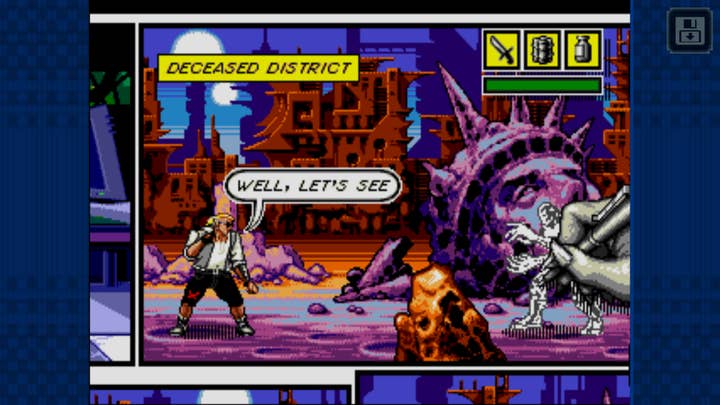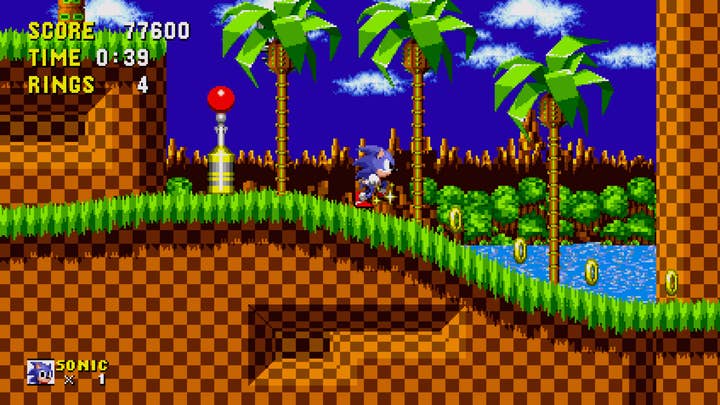Sega Forever: The nostalgia trip that could change the company's future
The publisher's Mike Evans explains how free retro games on mobile could restore Sega to its former glory
Sega has today announced a range of retro games for smart devices, but there's more behind this move than simply cashing in on childhood memories.
The new series, Sega Forever, takes classic titles from throughout the Japanese stalwart's 30-plus years of publishing and releases them for free to anyone with a smartphone or tablet. Starting with five games at launch, the company plans to release another two to three games per month - all with the same Forever branding.
It's a determined and long-term commitment that shows how important mobile has become to the publisher. Sega Networks' chief marketing officer Mike Evans - who proudly claims Sega Forever as his brainchild - says it hinges on taking full advantage of what it has over other mobile firms: a portfolio brimming with popular franchises.
It's a long-term strategy inspired by the various mobile publishers who create cross-promotion networks with their games portfolios. Ketchapp, in particular, stood out to the exec; the firm's rapid pace of new releases means it is constantly gaining new users and improving its discoverability, with each app pushing players towards the others.

"We're creating a network as well," Evans tells GamesIndustry.biz. "I really do believe that from the IP we have, the cost structure that we have and the growth you see within the advertising space, we'll have more than enough volume to support what we're doing."
He continues: "The model that we're taking - it's not a paid model, it's ad-supported [with a single $1.99 purchase to remove the ads] - democratises retro gaming and takes it to the mainstream. From the tests we've done previously, what we've found is there's more than enough demand for the IP. Certain IP is going to perform in different ways, particularly if you take something like Sonic or Crazy Taxi versus something a bit more niche like Comix Zone. But what we're doing is building a network, and that allows us to support all the games."
These retro titles won't just support each other, but also the non-Forever mobile releases from Sega. Evans points to recent launch Crazy Taxi Gazillionaire as a title that stands to benefit from a interest in the original coming to mobile. And, he posits, people who are willing to spend the $1.99 to remove ads from a Forever title might be inclined to spend just as much, if not more on a newer title in their favourite franchise.
"We'll monetise users at a certain rate with that network model, but from there we're creating games that have high affinity with those users and then we can cross-promote users into those games"
"We'll monetise users at a certain rate with that network model, but from there we're creating games that have high affinity with those users and then we can cross-promote users into those games, solving some of the challenges that many mobile guys have within the user acquisition space," he explains. "We can then monetise some of those users at a slightly higher rate on some of those other gaming experiences as well.
"Going forward, what you're going to see is a lot of Sega-based or even third-party experiences that fit really well with the audience we create with this network, and allow us to support the network from the additional games we're making as well."

Sega Forever is in no way an isolated strategy - it ties in with the publisher's overall plan to capitalise on its past glories. Back in May, a corporate strategy presentation revealed the company hopes to boost game sales by 50% by 2020 by reviving "major IPs" - and a network of nostalgia-driven mobile titles could be the key to deciding which ones.
"Once we have that audience, we'll be able to create further games and experiences for that audience as well."
"One of the key reasons [we're launching this] is the insight," Evans explains. "Within all the games, we're running ongoing surveys and we're always super interested to understand what our fans want. We'll able to chart the relative strength of the IP, we'll be able to understand the demographics and the psychographics of the people who are playing the games, and once we have that audience we'll be able to create further games and experiences for that audience as well."
Not only will this help Sega judge what new titles to build for mobile, such as Crazy Taxi Gazillionaire, Evans believes it might also influence games destined for other platforms like a "reimagining of Crazy Taxi on console" (although it should be stressed that such a project is not currently in development).
It's an ambitious outlook, but one that seems to rely heavily on nostalgia or curiosity driving mobile users to these Sega Forever titles, and thus the surveys. Nostalgia is factoring into countless commercial decisions across all forms of entertainment, with the ongoing revival of '80s and '90s properties seemingly unabating.
For a single product, or perhaps a couple, this is a fairly risk-free move, but is there not great danger in building a multi-year strategy based purely on nostalgia? Evans doesn't think so.
"Nostalgia is actually very much in vogue, which is one the reasons we've been chasing it down," he says. "Everything Nintendo has been doing has been driving big waves in nostalgia, they've done some amazing things and they had a lot of success with the classic NES. There is a film and documentary coming out about retro gaming called Console Wars. We also have a Sonic movie coming in 2019."
There are innumerable other examples the exec could draw on, but such a strategy still only works as long as the people with disposable income and free time are keen to revisit such products. Given how long Sega is planning to roll out Forever titles, will the firm be able to adapt if that nostalgia dissipates?
"Nostalgia doesn't die away... Things go in and out of trends, but that's been consistent for the last two decades"
"That's not something we've seen," says Evans. "Nostalgia doesn't die away. For a lot of us, this is fundamentally part of our childhood, we've grown up with something that's really formative for us and I don't think that disappears. Things go in and out of trends, but that's been consistent for the last two decades."
Even so, casually giving away almost your entire back catalogue must make it more difficult to monetise it in future. Sega has previously cashed in with these titles through the Virtual Console on various Nintendo platforms, or in Mega Drive Collections for PlayStation and Xbox - the latter being full retail titles. Only last year, the publisher launched the Sega Mega Drive Classics Hub on Steam, where many of the same games are being sold. It's a tough enough ask to get consumers to fork out for decades-old titles, and even more so if they're available for free on their mobile phone.
Evans disagrees: "Ever since we left the hardware business, we've always tried to take the content to where the consumers are rather than penalising them for their choice [of platform]. Depending on your own gameplay experiences and your own platform choice, I don't think it will necessarily cannibalise.
"We're reviving interest in some of the IP, and if the user gets into that IP and decides they want to buy it on another platform, they can do that as well"
"Different games offer slightly different experiences. Some people are very, very satisfied playing games on mobile, others will prefer a widescreen version. If anything, there's a funnel effect: what we're doing is reviving interest in some of the IP, and if the user gets into that IP and decides they want to buy it on another platform and play in their living room then they can do that as well."
Again, Evans is suggesting that players who enjoy these classics on mobile might be inclined to invest in fresh experiences from Sega, and with retro-flavoured releases like Sonic Mania on the way, it's a strategy that looks increasingly feasible.
It's not unlike Nintendo's current mobile push, creating new experiences for mobile that introduce users to a franchise in a way that can (and has) led to sales of more recent titles. Pokémon Go and Fire Emblem Heroes have both done wonders at shifting 3DS titles and even the handheld itself.

Sega Forever is the culmination of a lot of hard work, particularly on Evans' part as he spearheaded the whole strategy. And while consumers might assume it's simple to reformat classic games for mobile devices - particularly when so many have already been re-released on other platforms - the process has actually been a lot harder than you might think.
"We've gone through the whole back catalogue trying to identify the games that make sense [for this model]. We've gone through all the licensing and music considerations that went with the original games - that was a fair bit of work"
"It's taken me over a year to get to this point," says Evans, with no small amount of relief in his voice. "We've gone through the whole back catalogue trying to identify the games that make sense [for this model]. We've gone through all the licensing and music considerations that went with the original games - that was a fair bit of work.
"Then we spent a lot of time on the actual wrapper technology, which is our secret sauce. We knew these games existed elsewhere online and had been pirated, so we wanted to build in some additional functionality that really made them suited to mobile. Stuff like controller support, which is something we didn't need to do but really wanted to. We've worked on leaderboards, integrated sticker pack functionality - we've spent a lot of time trying to get this right.
"It's not an easy process, but it's a labour of love."
The teams even dusted off each of the old consoles and played the original games side-by-side with the emulations to ensure they're as close to the originals as possible - aiming for what Evans refers to as "faithful emulations". This process will be employed for future Sega Forever releases, and could even benefit the earliest ones.
"That's the beautiful thing about mobile, it's not just 'ship it and forget'," says Evans. "There's going to be various things you'll see post-launch as we update some of these games as well."
Initially, many of the games released under the Forever umbrella will be from older consoles or converted from past mobile launches, but Evans hopes to eventually have a range that spans the entire history of Sega hardware - yes, even Dreamcast and Saturn.

Sega's last two consoles have proven to be somewhat tricky, however. Not only do they have more complicated control schemes that need to be simplified for touchscreens, early attempts at emulating them on mobile failed to deliver the quality Evans and his team hoped for. The CMO reports Sega has "an ongoing R&D project" looking at improving on this, but until then it will be using those surveys and other community channels to scope out which titles warrant full ports.
"The dev time and build progress is longer, but with our forecasts over the next 18 months, we will be able to support Dreamcast titles as well"
"Yes, it's more expensive... [and] obviously, the dev time and build progress is longer, but with the increasing CPMs forecast over the next 18 months, We will be able to support those titles as well," he says.
In the initial presentation we saw, Sega made a big deal about the fact that it's building a new brand in Forever. All the titles will be presented in a similar way, and the app icons will follow the same style. With such efforts going into establishing a new brand, could we see it brought to other marketplaces such as the PlayStation or Xbox store?
"About 90% of the games so far are in Unity," Evans explains. "The reason we chose Unity as middleware is it enables us to take this content to other platforms as well.
"So my first focus is mobile. It's a huge project and what I really want to do is get mobile right. After this, there are options: we can look at desktop, Facebook, we could even take these games to consoles like Switch.
He continues to speculate that further down the line a subscription-based version of the Sega Forever range could be released through set-top boxes like Apple TV. If this proved to be successful, Sega could even look at releasing titles that were never launched in the West before - something that will primarily appeal to the die-hard fans. If such titles proved to be of interest, Evans even surmises that the community could be brought in for translation projects.
In his final interview at Sega Europe, COO Jurgen Post told GamesIndustry.biz he still believes that the Sega brand can flourish again - primarily through successful studios such as Creative Assembly and Amplitude. But while Post believes this will centre around looking forward to future hits, Evans is confident that revisiting past successes is also the way to go.
"It will really help," he says. "Using the model we have [we're] setting a treasure trove of IP free on mobile, and allowing people to experience that - and perhaps sharing it with their children. Allowing people to re-experience our IP and sharing those experiences is key to reviving it."
